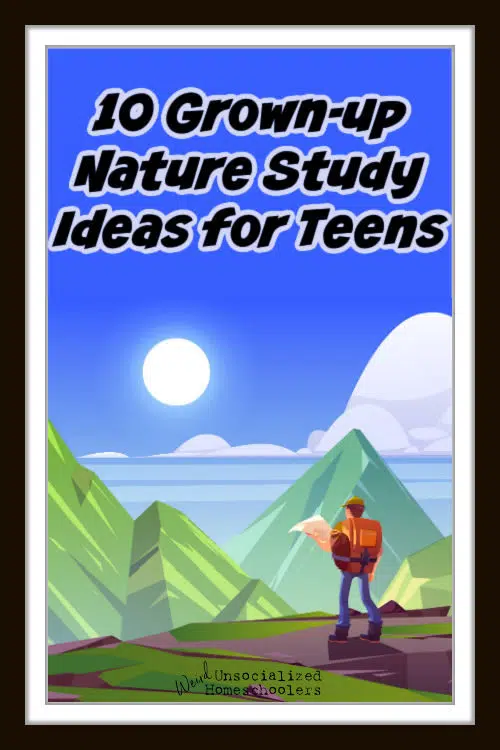10 Grown-up Nature Study Ideas for Teens
For many homeschooling families, nature study plays a significant role in the elementary years. Then, it gives way to more serious science in the high school years. However, nature study remains relevant for high school science. That’s why I’m sharing 10 grown-up nature study ideas for teens.
10 Grown-up Nature Study Ideas for Teens
1. Zoos and Aquariums
Most zoos and aquariums have volunteer programs. Working with animals and marine life in a setting that focuses on conservation, breeding, and habitats provides an excellent way to learn about creatures that most of us aren’t going to encounter on an average nature walk.
And you don’t necessarily have to live near a big city to look for these programs! If you live near a small zoo, check to find out if a volunteer program is available. You never know!
Or, better yet, help guide your teen through the process of finding out about volunteer programs! This will be a valuable skill when your teen is ready to look for a part-time job or if he or she wants to work with other volunteer organizations in the future.
And, while a resume may not be required, it’s a good opportunity to work on creating one. There might not be much work experience to add to it yet, but you can add personal information, other volunteer experiences, education, contact information, skills, and leadership experience for now.
2. Conservation Projects
Your teens can learn about nature while taking part in a conservation project. Some ideas include:
- Participate in The Great Backyard Bird Count
- Volunteer as a sea turtle nest parent.
- Clean up waterways, beaches, etc.
- Plant trees.
- Build nesting boxes for birds, squirrels, or bats.
3. National Parks
There are 63 national parks in the United States. Visit as many of them as you can! Observe and journal the flora, fauna, wildlife, insects, and birds that you see at each.
Some teens and adults may be interested in the Youth and Young Adult Programs that are available at some parks. They can learn things like how to become a:
- wildland wildfire fighter
- biologist
- trail-builder
- museum curator
- park ranger
and more! These programs are for youth and adults up to age 30 and veterans up to age 35, so even your young adult “children” can participate!
4. Hiking Trips
Day Trips and Overnight Trips
With teens, you can plan more advanced hiking trips than you can with younger children. Consider some day-long or overnight trips. For day trips and overnight trips, there isn’t as much planning involved, but you should still allow your teen to be part of the planning process. It’s part of the fun and is an important life skill besides giving your teen a reason to consider things such as weather, time of day, map skills, etc.
Extended Trips
For extended trips, such as hiking the Appalachian Trail, you and your teen will need to consider many more questions as you plan and prepare. As part of your nature study, you may want to plan to read and research the answers to questions such as the ones listed below.
- What food will you need to take with you?
- How long will your food last?
- Do you need to take equipment for food preparation?
- How will you clean up after meals?
- How will you carry water?
- What clothing and shoes will you need?
- What will the weather be like?
- Will you need safety gear or any special equipment?
- Will you need a map or compass? (Does your teen know how to use them?)
- Will you need a sun hat, any medications, etc.?
- How will you start fires?
- What will you do in case of an emergency?
- Will you bring card games (etc.) for fun?
- How will you communicate with folks at home?
- How will you charge your cell phone?
- Do you need permits, etc.?
There are lots of great articles to help you prepare! This series on How to Go Backpacking is a good place to start.

5. Bird-watching
Bird-watching is a fantastic hobby for all ages, but teens can sit quietly for much longer periods than small children, making them ideal candidates for more advanced bird-watching outings. Birding is a great way to spend some time with your teens, and it has quite a few educational benefits too!
This article about doing a Backyard Bird Study is full of information about doing your own bird study or about participating in the Great Backyard Bird Count (which happens every year in mid-February).
6. Animal Rescue or Rehab Centers
If you have an area animal rescue or rehab facility, your teen may want to check for volunteer opportunities. Or you may just want to arrange a field trip to talk to the animal caretakers.
You may be able to find out more about the medical care and feeding of the animals there, and you can probably find out more about how the animals are put up for adoption. Some animal rescue centers have animals that can be fostered, too, until a permanent home is found for them.
Most animal rescues and rehab centers are continually in need of donations, so another possibility is finding out how you can plan a fundraiser to help out! This will inject a little math and economics into your nature study too.
7. Snorkeling
If you live in an area where snorkeling is an option, consider taking advantage of the unique opportunity to see marine life in their natural habitat.
You might also want to consider participating in one of our Homeschool Road Trips! We always have fun nature-related studies and activities for parents and students. Check out the travel section of our other website, Hip Homeschool Moms, to see the latest Homeschool Road Trip information or to check out previous trips for ideas!
We call them HEART trips. Homeschool Enrichment Adventure Road Trip ♥
8. Camping or Caving
Both offer a chance to see nature from a different perspective. Caving may allow you to observe unique mammals, such as bats. Camping offers stargazing opportunities, along with a chance to see nocturnal wildlife in action.
And both of these activities, like hiking, allow you and your teen to work together to find locations and make plans for your trip.
9. Gardening
Let teens plant and maintain their own flower, herb, or vegetable gardens. There are lots of nature study topics related to this! I’ll name a few:
- Learn about companion gardening and herbs that repel garden pests.
- Learn about medicinal herbs.
- Make your own garden soil.
- Learn about heirloom seeds.
- Grow a pizza garden.
- Build a ladybug house for your garden.
- Journal the various stages from seeds to mature plants.
- Do some research on preparing the soil or raised beds for their gardens.
- How do they take care of their plants as they grow?
- How much water will each kind of plant need?
- Research to find out which plants do best in full sun and which do best with some shade.
10. Learn About Birds, Bees, Flowers, and Trees
- Visit (or look for volunteer opportunities at) a local botanical garden. (Remind your teens to take their nature journals.)
- Visit (or volunteer at) a local butterfly house. (Again, remind your teens to take their nature journals.)
- Visit someone local to you who keeps bees. (You guessed it! Remind your teens to take their nature journals.)
- At each location, learn how the plants are planted, grown, and cared for. Or learn how the bees are cared for.
- Learn how bees make honey and pollinate plants. What are the roles of the different bees in the colony?
- Learn the parts of trees and flowers.
- Learn about the various kinds of trees and flowers. (Conifer or deciduous? Annual or perennial?)
- How do bees and plants grow and change during the different seasons?
- How do they find or make food during the different seasons?
There are so many ways to include nature study as part of your teens’ homeschool curriculum and everyday life! I hope you found something from this list that you want to try or that it helps you come up with some ideas of your own. Do you have some ideas to share? Please do so in the comments!
Kris Bales is a newly-retired homeschool mom and the quirky, Christ-following, painfully honest founder (and former owner) of Weird, Unsocialized Homeschoolers. She has a pretty serious addiction to sweet tea and Words with Friends. Kris and her husband of over 30 years are parents to three amazing homeschool grads. They share their home with three dogs, two cats, a ball python, a bearded dragon, and seven birds.






I am a homeschooling mom and it sometimes feel like I exhaust the option of things to do, this is a great list to work through. Thanks for sharing.
thank you